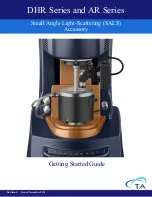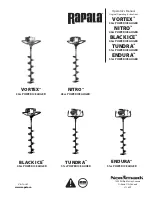
11
Installing Dispensing Hanging Hardware
Dispensing Hanging Hardware is defined as the
connecting point on a dispenser where the Healy System
Hose Assembly or the Healy System Hose Adapter
connects to the original dispenser product outlet casting.
Installing Dispensing Equipment
1. Completing the connection of Healy Systems
dispensing equipment requires the installation
of Healy Systems Phase II dispenser adapters,
coaxial hoses, and nozzles (Hanging Hardware).
If applicable, remove existing non-Healy hanging
hardware (from the dispenser product outlet
adapter to, and including, the nozzles).
2. Vapor ready dispensers will require a Healy
Systems adapter to make the hose threads
compatible with other Healy Systems equipment.
Install the adapter according to the instructions
that come with it. Various adapters are available,
depending on how the dispenser is configured:
M34 metric (Healy designation F3 or S3) or
balance ready (Healy designation S4).
3. Healy Vapor Recovery Hoses are available in
various lengths to meet local ordinances. Install
Healy Vapor Recovery Hoses according to the
included instructions.
4. Breakaways are required; install either a model
8701VV Breakaway or a model 807 Swivel
Breakaway. Install the breakaway using the
instructions supplied with the unit.
5. Last, install the Healy Systems nozzle. Check to
be sure that the nozzle holster (boot) is mounted
in the highest position. Check for proper fit in the
nozzle holster (boot) and that the nozzle can be
locked in the off position. Also be sure that when
the nozzle is locked, the dispenser cannot be
activated from the locked position.
Hose Adapters
• Use the CX6-A for “Non-Vapor Ready” dispensers with
NPT connections (Universal).
• Use the CX6-AE for Non-Vapor ready dispensers with
BSP connections.
• Dispensers containing existing “VacAssist” or “Balance”
Stage II piping DO NOT use this adapter.
Hose Adapter
Non-Vapor
Standard Units
(Fixed Elbow)
Healy Threads
NPT or BSP Threads
Vapor Port
Figure 12: Non-Vapor Ready Adapter
Testing the System
1. Carefully review all work completed, making sure
that all mechanical joints are thoroughly tightened
and that all electrical connections are sealed.
2. Restore power to the dispenser.
3. With the power on, but no nozzles authorized, the
VP1000-220-IC should not be running (unless the
ambient temperature is below 40 ºF [4 ºC]).
4. Authorize one handle and the vacuum system
should activate when the gasoline flow control
valve is engaged. Repeat for all other nozzles,
individually testing each side of the dispenser.
5. Authorize one nozzle and listen to the speed of
the VP1000. With only one nozzle activated, the
speed will be slower than if a nozzle on each side
is activated. Activate a nozzle on the other side of
the dispenser and listen for the speed to change.
6. Continue to the Start-Up / New Installation /
Warranty / Annual Testing Form and perform items
B3-B6.
VP1000-220-IC Troubleshooting
Important:
Use extreme care and caution when performing the
tests listed below.
• With power applied to the dispenser, but no products
authorized, there should be 220 VAC between the
18 AWG black and black wires in the junction box.
• With a product authorized, hook signal voltage (12-250
Volts AC or DC) should be present between either red
and purple wires.
• The electronics of the motor will make three attempts
to start the pump. If it detects a problem, on the fourth
unsuccessful start, the pump will be in a fault condition
and shut down.
• To remove a fault condition on the VP1000-220-IC,
remove power to the dispenser for 15 seconds and
restore power.
• Continue to the Start-Up / New Installations /
Warranty / Annual Testing Form and perform
items B1-B6.


































